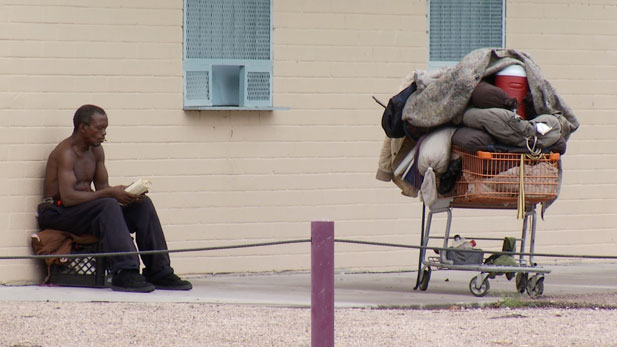 Homeless man reading near Santa Rita park.
Homeless man reading near Santa Rita park.Listen:
Tucson is trying to end homelessness among military veterans by the end of this year, and and that will require agencies that already work on that problem to work together.
The city was selected as one of 25 in the country poised in 2013 to implement programs to house homeless veterans, and in turn, develop services that could expand to the rest of the homeless population.
 Jodi Frederick, Southern Arizona VA
Jodi Frederick, Southern Arizona VA
"There’s veterans out there that obviously we haven’t found, so I guess one of the ways we look at it is when our point-in-time count goes down to zero then we can consider that fairly successful," said Jodi Frederick, clinical director of homeless outreach at the Southern Arizona VA.
The question is whether it’s realistic to get to zero homeless veterans by the end of the year.
“I think it will take longer than that, and I think they’re looking now at maybe making it 2016, because it’s a huge accomplishment or venture to try," Frederick said. "I think as long as we keep trying, and we keep housing people then we’re being successful.”
One in every 131 people in Tucson will experience homelessness in a year, or twice the national average, said Tom Litwicki, chief executive of Old Pueblo Community Services. That is one of the organizations that work with people who are homeless, mentally ill or addicted to drugs or alcohol.
 Tom Litwicki, Old Pueblo Community Services
Tom Litwicki, Old Pueblo Community Services
“The average person who’s been chronically homeless for seven to eight years, so the challenge is to help somebody get out of homelessness who has been in that condition for a long period of time,” he said.
The strategy for years has been to first get a person to solve the root problems that led to homelessness, such as addiction or unemployment, Litwicki and Frederick said.
But a new strategy has been in place the last few years.
“Housing first is just the opposite. Let’s get you housed and then you can work on whatever issues you have," Frederick said. "Because if you’re living on the street there’s no way you can deal with other issues. So you take care of the basic needs first.”
Even more importantly, Litwicki said, is coordinating all of the care offered at dozens of locations in Tucson.
“The next thing that we’ll have to do is coordinate our entry into services based on need,” he said.
The most vulnerable person would rise to the top of the list for housing, while those who have less urgent needs may be able to wait for an appointment with a counselor.
Within the VA system, that's already how it works, Frederick said. Veterans show up at the VA with more than one need: medical care, housing, or a haircut or clothing for a job interview.
"Usually what happens is they’ll come in through our door and they’ll ask for assistance and then well do an assessment on them to see what kind of needs that they have housing, and as far as other needs too education, mental health issues," Frederick said.
The VA is able to look at the scope of a veteran’s needs and offer more than one kind of service. Litwicki says all of the community service organizations in Tucson need to do a better job of linking their services together.
Watch more of AZPM's interviews with Litwicki and Fredericks on Metro Week here.

By submitting your comments, you hereby give AZPM the right to post your comments and potentially use them in any other form of media operated by this institution.